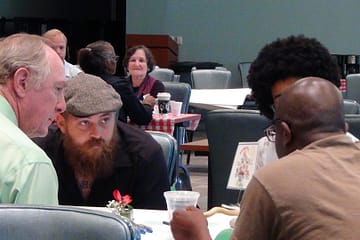Lectionary reflection II Corinthians 5:16-21 Lent 4 Year C
Jean Cooley, Co-pastor Westminster Presbyterian Church, Lakeland, FL
In many ways Paul’s great discourse on Christ’s gift of the ministry of reconciliation gets to the heart of what it means for me to be a Christian. Paul affirms that those that “are in Christ” see reality in a new way. No longer do they see reality through the values and commitments of the world. Those in Christ see the world through the eyes of Christ. Their commitments and values become those of Christ: to love God and neighbor in the way that fulfills God’s vision of Shalom – a world in which justice and peace are realized for everyone.
When one is “in Christ” and sees reality through the eyes of Christ one is commissioned as an ambassador for Christ on earth, Paul argues. Ernest Best in his commentary on II Corinthians reminds us that ambassadors have the power to speak for those that they represent and that they can and should act on their behalf. Ambassadors reconcile those that are in conflict. This is their job. They put themselves on the front line to reconcile people and situations in which there is alienation, injustice, war and conflict of any kind that divides those to whom the ambassador is accountable.
Those who are ambassadors for Christ have a particular portfolio. Because they (that means those of us who call ourselves Christians) represent Christ they are given the mandate to reconcile any force that prevents God’s Shalom from being manifest. Wherever God’s justice and peace is broken, wherever groups and individuals suffer because of inequities, God sends Christ’s ambassadors to reconcile what is broken. It is not an easy job!
We are experiencing such brokenness here in our home town. Our challenge is how to be Christ’s ambassadors where we live and buy our tomatoes. Publix grocery store is our home grocery. My husband and co-pastor, Bill, is the primary shopper and cook in our household. He loves the well-stocked produce, the attractive, clean and efficient space, Publix’s commitment to hiring staff with disabilities, and their responsiveness to his requests for special foods. The foundation arm of corporate Publix has given many grants to improve life in Lakeland.
When we heard of Publix’s refusal to help bring justice to the tomato pickers that supply Publix’s tomatoes that are suffering from slavery, and inhumane working conditions and wages, we were appalled. Publix has power and influence in our city, state and southeast region. We believe that if Publix chose to use their power on behalf of the farm workers, they could affect life-enhancing change. We, loyal customers of Publix, are left feeling a deep sense of brokenness. Publix has broken trust with those who pick and supply their produce, with their civic responsibility to work for the common good, and with their customers. Even when confronted with these evils Publix has refused to even talk with those that are hurt most by their actions. In the face of Publix’s sinful action we ask ourselves how we should respond.
Paul is very clear that as ambassadors for Christ, when we see where such brokenness exists, we are called to act for reconciliation. We begin by standing with those who have been harmed the most, in this case, with the tomato workers. We can help to amplify their voice, in a world where those with the most power get heard. We are called to use our influence as consumers, community partners, and people of faith with a conscience to call for justice. Now that Christ has opened our eyes to see the injustice around us we cannot pretend that it does not exist. We have the mandate, as ambassadors for Christ, to be on the front line working to affect reconciliation.
The work of ambassadorship is hard and long, and there may be no early sign that the reconciliation Christ so desires is at hand. In this season of Lent we acknowledge the pervasive nature of sin in our lives, individually and systemically. It is because of Christ’s reconciling work on earth that we have the assurance that we are free to acknowledge our own brokenness, our tendency to turn a blind eye to the injustice around us, and to receive the grace of God’s reconciling love. As Paul says, “…in Christ God was reconciling the world to himself, not counting their trespasses against them…” Now forgiven, Paul commissions us by saying that Christ is entrusting us with the message of reconciliation. There is no guarantee that our work as ambassadors will be immediately successful. We are called to try and to know that in our trying we are being reconciled to God.
